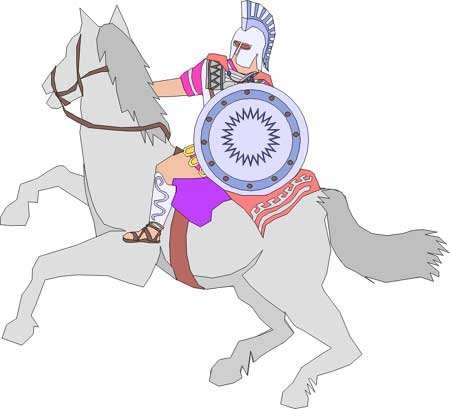Alexander the Great

Alexander the Great was the son of Philip II of Macedonia. Macedonia was located in the northern part of the Greek peninsula. His father had succeeded in conquering Greece, Thrace, and Chalcidice. Philip II was about to attack the Persians when he was murdered. Alexander, at the age of twenty, took over where Philip had left off and continued to expand their empire.
At the age of thirteen, Alexander was tutored by the famous Greek philosopher Aristotle for several years. Under Aristotle’s influence, Alexander developed a great respect for the Greek culture, literature, and science. Alexander took geographers and other scientists with his army to expand his knowledge of plants, animals, and geography. Alexander proved himself to be an incredible military commander. In his first battle against the Persians at the Granicus River, he proved his skills. The Persians had lined up their cavalry along the river with Greek mercenaries behind them. He was advised by his general to wait until the next day to attack. However, Alexander figured that the formation of the Persian army would limit the ability for their cavalry to maneuver, giving him a tactical advantage. Alexander attacked that afternoon and won the battle. After the battle, he took care to help the families of his dead soldiers and visited all of his wounded soldiers. He won the loyalty of his troops from his actions. His second battle against the Persians was at Issus. This time the king of the Persians, Darius III, led his troops. During the battle, Alexander ordered a charge of his infantry through a heavy barrage of enemy arrows. This move took Darius and the Persians by surprise and caused a full retreat of Darius’s forces. Alexander was able to capture Darius’s wife and children. Alexander took his troops south to the rich valley of the Nile River in Egypt. There the Egyptians greeted him like a liberator. They hated the Persians and were glad to have them removed from power in Egypt. Alexander founded a new city, Alexandria, along the Nile Delta. Alexandria became the center of trade along the eastern Mediterranean Sea. Alexandria also won fame for its very large library and lighthouse. Alexander moved his army north to again face the Persians, this time at Gaugamela. He used unusual tactics of setting his army at angles to the Persians and spreading the length of the line. With these tactics, he was able to penetrate the Persian line and once again gain victory. After this defeat, Alexander was able to conquer the rest of the Persian empire city by city. Alexander turned his army east, conquering lands all the way to India. In India he met up with King Porus at the Hydaspecs River. Porus’s army was several times larger than Alexander’s and had 200 war elephants. Alexander again used his military genius to win the victory. He had part of his forces cross the river at night and draw off the Indian cavalry. Then he attacked the elephants with arrows and javelins, which caused them to stampede and trample their own troops. This sent the Indian troops into disarray. Porus surrendered to Alexander, and they eventually became allies. Alexander wanted to continue to drive further east into India, but he was unable to do so. The core of his army, his Macedonian and Greek troops, refused to go on . They had marched over 11,000 miles over eight years. They wanted to return to their homes and families. Alexander agreed and turned the army west to head back. He split his army, sending some along the coast and others by sea. The trip back along the coast was brutal. They went through a desert, and many troops died of exhaustion. It is estimated that Alexander lost over three-fourths of the troops on that overland march. By the time he reached Babylon in April of 323 B.C., he was exhausted. In May of that year, he came down with stomach cramps and fever and died of pneumonia on June 10, 323 B.C.
In his short career, Alexander developed an empire of over one million square miles. Everywhere he conquered, he spread the Greek language and culture. After his death, his kingdom was divided into three separate kingdoms ruled by the descendents of his generals.
Famous People in Greek History
Alexander the Great Aristotle Draco Pericles Plato

